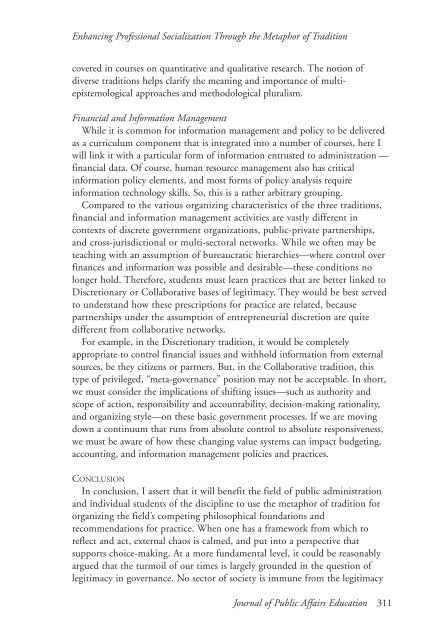JOURNAL OF PUBLIC AFFAIRS EDUCATION - naspaa
JOURNAL OF PUBLIC AFFAIRS EDUCATION - naspaa
JOURNAL OF PUBLIC AFFAIRS EDUCATION - naspaa
Create successful ePaper yourself
Turn your PDF publications into a flip-book with our unique Google optimized e-Paper software.
Enhancing Professional Socialization Through the Metaphor of Tradition<br />
covered in courses on quantitative and qualitative research. The notion of<br />
diverse traditions helps clarify the meaning and importance of multiepistemological<br />
approaches and methodological pluralism.<br />
Financial and Information Management<br />
While it is common for information management and policy to be delivered<br />
as a curriculum component that is integrated into a number of courses, here I<br />
will link it with a particular form of information entrusted to administration —<br />
financial data. Of course, human resource management also has critical<br />
information policy elements, and most forms of policy analysis require<br />
information technology skills. So, this is a rather arbitrary grouping.<br />
Compared to the various organizing characteristics of the three traditions,<br />
financial and information management activities are vastly different in<br />
contexts of discrete government organizations, public-private partnerships,<br />
and cross-jurisdictional or multi-sectoral networks. While we often may be<br />
teaching with an assumption of bureaucratic hierarchies—where control over<br />
finances and information was possible and desirable—these conditions no<br />
longer hold. Therefore, students must learn practices that are better linked to<br />
Discretionary or Collaborative bases of legitimacy. They would be best served<br />
to understand how these prescriptions for practice are related, because<br />
partnerships under the assumption of entrepreneurial discretion are quite<br />
different from collaborative networks.<br />
For example, in the Discretionary tradition, it would be completely<br />
appropriate to control financial issues and withhold information from external<br />
sources, be they citizens or partners. But, in the Collaborative tradition, this<br />
type of privileged, “meta-governance” position may not be acceptable. In short,<br />
we must consider the implications of shifting issues—such as authority and<br />
scope of action, responsibility and accountability, decision-making rationality,<br />
and organizing style—on these basic government processes. If we are moving<br />
down a continuum that runs from absolute control to absolute responsiveness,<br />
we must be aware of how these changing value systems can impact budgeting,<br />
accounting, and information management policies and practices.<br />
CONCLUSION<br />
In conclusion, I assert that it will benefit the field of public administration<br />
and individual students of the discipline to use the metaphor of tradition for<br />
organizing the field’s competing philosophical foundations and<br />
recommendations for practice. When one has a framework from which to<br />
reflect and act, external chaos is calmed, and put into a perspective that<br />
supports choice-making. At a more fundamental level, it could be reasonably<br />
argued that the turmoil of our times is largely grounded in the question of<br />
legitimacy in governance. No sector of society is immune from the legitimacy<br />
Journal of Public Affairs Education 311
















